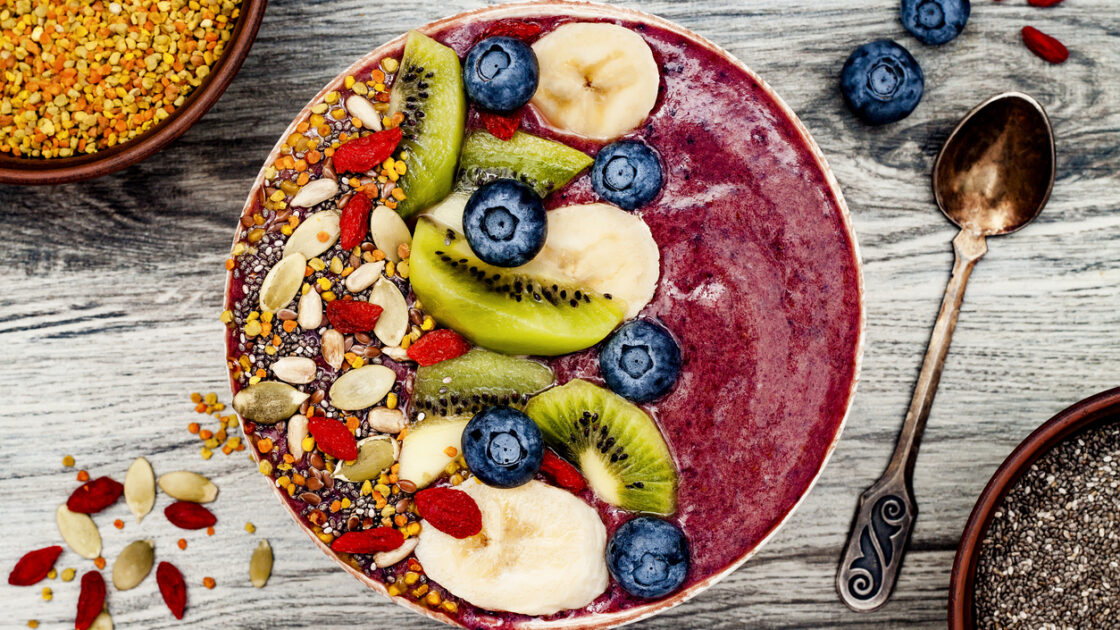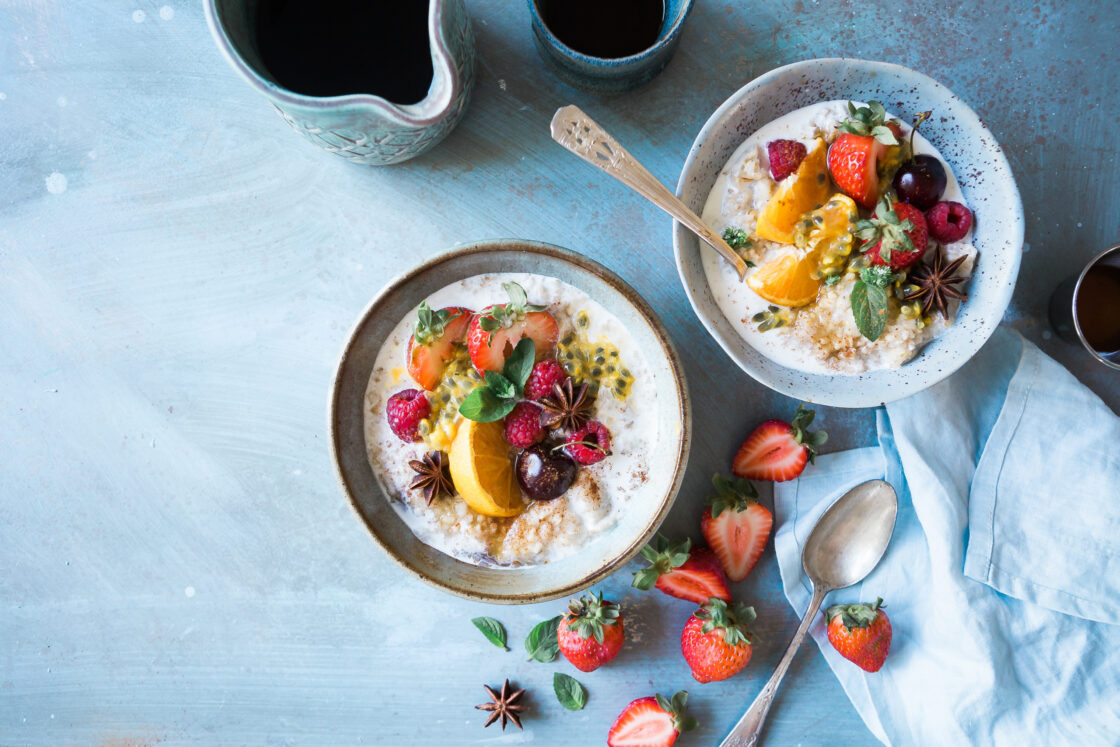Busting Healthy Breakfast Myths: Dr. Mark Hyman’s 5 Tips to Eat Smart in the Morning
How do you know if you're eating a healthy breakfast? Dr. Mark Hyman busts some of the most common breakfast myths. You have healthy breakfast questions, he has answers.

We’ve all heard that a breakfast is the most important meal of the day, but that doesn’t mean any old breakfast will do. It’s important that your first meal of the day be a healthy breakfast, and some of us still have some outdated notions as to what that entails.
Luckily, Dr. Mark Hyman, author of the New York Times bestseller Food: What the Heck Should I Eat? has more than a few thoughts on the topic that he’s willing to share. He’s busting five popular healthy breakfast myths to help you discover the healthiest way to start your day.
Check out our guide to greens powders to find out how you can start your day off right and fill any nutritional gaps in your diet. We’ve also done deep dives on the big three when it comes to greens supplements — see what chlorella is good for, if it might be time to consider wheatgrass, or if you should experience the wonders of spirulina powder.
1. Skipping breakfast is a bad idea.
More experts are challenging the idea that skipping breakfast is a bad idea, thanks in large part to the increasing popularity of intermittent fasting. One 2014 paper1 notes that while breakfast has long been considered the most important meal of the day, in reality, it’s “just another meal” and “prolongation of overnight fast, which depends not only on timing of [breakfast] but also on timing of the last meal of the day, can be beneficial.”
Intermittent fasting has been shown by some experts2 to contribute to accelerated cell repair and weight loss, and Hyman ascribes to this belief.
“Sometimes I might skip breakfast and have a bulletproof coffee to stay in the level of ketosis and continue fasting,” he says.
The Takeaway: If you don’t have time for a healthy breakfast, it’s probably better to skip it entirely than load up on sugary junk.
2. A cold-pressed juice is the perfect healthy breakfast option.
The fresh-pressed juicing trend reached astronomical heights back in 2016, when, Forbes3 reported, it became a $3.4 billion industry. But while a juice can be a great way to get tons of vitamins and minerals into your diet first thing in the morning, Hyman warns against drinking too many of your veggies and – especially – fruits.
“When you drink fruit, it doesn’t create the sensation of fullness you get when eating it,” he says. “This is because whole fruits contain fiber. Also, your brain doesn’t recognize calories the same way it does those you eat. As a result of those two factors, you end up consuming more calories drinking juice or sugar-sweetened beverages than when you do eating whole fruit.”
And don’t think that just because your juice is mostly veggies you’re in the clear: sweeter vegetables like carrots and beets, so popular in juices thanks to their flavor, can have the same effect on your body as fruit.
The Takeaway: If you’re going to have a juice as part of a healthy breakfast, consider serving it alongside something a little bit heartier that will keep you full.
3. Oatmeal is a healthy breakfast choice.

If it seems too good to be true… it probably is. According to Hyman, many foods that we traditionally consider to be breakfast foods are really desserts.
“You would never eat ice cream for breakfast, but many cereals, toaster concoctions, muffins, and other things that pass as breakfast – even ‘healthy’ choices – contain as much if not more sugar,” he says. And consuming this much sugar first thing in the morning has devastating effects on the rest of your day.
“When you start your day with sugar, you kick off an addictive cycle of sugar and carb cravings that will last all day long,” writes Hyman in his book.
Fruit-flavored yogurts, most bran muffins, and the vast majority of granola bars can all set off this cycle – as can oatmeal, despite what many of us were raised to believe.
“Oatmeal has been touted as heart-healthy because the bran it contains reduces cholesterol,” Hyman writes. “However, there is often a ton of sugar in instant or microwavable oatmeal.”
Even if you choose plain, steel-cut oats, he says, oatmeal “spikes insulin and blood sugar, which makes you even hungrier.”
“While it’s a better breakfast than sugary cereal, oatmeal has a high glycemic index, which means having some for breakfast virtually guarantees that you’ll spend the rest of the day overeating,” he writes.
The Takeaway: Starting your day off with a sugary breakfast sets you up for a sugar-filled day.
4. Protein-rich breakfasts are hard to make during the week.
But if you’re not eating cereal, pancakes, or muffins, then what can you have? Hyman suggests a combination of protein and fat, which has staying power to keep you full and fuel you for the day ahead.
“Studies show protein-rich breakfasts can improve satiety and reduce evening snacking,” Hyman says. “Another showed a protein-rich breakfast helps reduce your hunger hormone ghrelin and increase cholecystekinin, which signals your brain to stop eating. Protein-rich foods like eggs, nut butters, or a protein shake steady blood sugar and reduce metabolic fluctuations later in the day.”
But that doesn’t mean you have to cook up a full English every morning. Here are a few of our favorite quick and easy healthy breakfast ideas rich in both fat and protein:
We would be remiss if we did not mention the healthiest cookware with which to make your healthy breakfast. Ensure you’re leaving toxins out of your meals by looking over our guide to the cleanest cookware out there and the best options for nontoxic bakeware.
5. Eggs are bad for people with high cholesterol.
For someone who eats animal proteins, one of the best healthy breakfast options is an egg. This, of course, goes against decades of nutritional guideline advice, but the jury is out, and eggs are finally in.
“After decades of avoiding eggs because we were told that cholesterol caused heart attacks, the 2015 US Dietary Guidelines officially exonerated them, finding no link between dietary cholesterol and heart disease,” writes Hyman. “Now eggs are a health food.”
But that doesn’t mean you should eat any eggs or prepare them any old way. Choose pastured eggs that come from chickens that have been fed a natural diet and have had access to the outdoors. Not only are they more humane, but a 2010 study4 showed that pastured eggs were richer in vitamins A and E, as well as in omega-3 fatty acids.
Choosing healthy eggs from producers you trust also means you can cook them runny, which Hyman says is the best way to consume them.
“Egg yolks, which happen to be the most nutritious part of the egg, contain powerful antioxidants,” says Hyman. “When the yolks are cooked in high heat, they will lose the amount of antioxidants they contain. To preserve these antioxidants, I recommend lightly cooking eggs.”
The Takeaway: Eat eggs: they’re cheap, they’re filling, and they’re good for you, provided they come from a good source and are cooked properly.
P.S. Did you know? Organic Authority has its own nutrition and wellness shop to meet your needs and help you take control of your health. Shop clean supplements for energy, sleep, inner beauty for skin support, protein, workouts, pantry items and more. Shop The Organic Authority Shop now.
More to Read on Organic Authority

4 Vegan Breakfast Recipes to Start Meatless Monday on the Right Foot
Here’s the Skinny on the Ketogenic (High Fat) Diet
Sources
1. https://www.ncbi.nlm.nih.gov/pmc/articles/PMC4042085/
2. https://www.healthline.com/nutrition/intermittent-fasting-guide#section4
3. https://www.forbes.com/sites/karenhua/2016/12/30/2017-new-year-resolutions-why-juice-generation-and-the-juice-cleanse-trend-have-survived-so-long/?sh=3680120d2fd4
4. https://www.cambridge.org/core/journals/renewable-agriculture-and-food-systems/article/vitamins-a-e-and-fatty-acid-composition-of-the-eggs-of-caged-hens-and-pastured-hens/552BA04E5A9E3CD7E49E405B339ECA32

